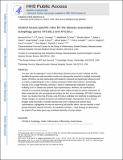| dc.contributor.author | Khor, Bernard | |
| dc.contributor.author | Conway, Kara L. | |
| dc.contributor.author | Omar, Abdifatah S. | |
| dc.contributor.author | Biton, Moshe | |
| dc.contributor.author | Haber, Adam L. | |
| dc.contributor.author | Rogel, Noga | |
| dc.contributor.author | Baxt, Leigh A. | |
| dc.contributor.author | Begun, Jakob | |
| dc.contributor.author | Kuballa, Petric | |
| dc.contributor.author | Gagnon, John D. | |
| dc.contributor.author | Lassen, Kara G. | |
| dc.contributor.author | Regev, Aviv | |
| dc.contributor.author | Xavier, Ramnik Joseph | |
| dc.date.accessioned | 2020-10-20T15:59:20Z | |
| dc.date.available | 2020-10-20T15:59:20Z | |
| dc.date.issued | 2019-08 | |
| dc.date.submitted | 2018-03 | |
| dc.identifier.issn | 0022-1767 | |
| dc.identifier.issn | 1550-6606 | |
| dc.identifier.uri | https://hdl.handle.net/1721.1/128135 | |
| dc.description.abstract | The clear role of autophagy in human inflammatory diseases such as Crohn disease was first identified by genome-wide association studies and subsequently dissected in multiple mechanistic studies. ATG16L1 has been particularly well studied in knockout and hypomorph settings as well as models recapitulating the Crohn disease–associated T300A polymorphism. Interestingly, ATG16L1 has a single homolog, ATG16L2, which is independently implicated in diseases, including Crohn disease and systemic lupus erythematosus. However, the contribution of ATG16L2 to canonical autophagy pathways and other cellular functions is poorly understood. To better understand its role, we generated and analyzed the first, to our knowledge, ATG16L2 knockout mouse. Our results show that ATG16L1 and ATG16L2 contribute very distinctly to autophagy and cellular ontogeny in myeloid, lymphoid, and epithelial lineages. Dysregulation of any of these lineages could contribute to complex diseases like Crohn disease and systemic lupus erythematosus, highlighting the value of examining cell-specific effects. We also identify a novel genetic interaction between ATG16L2 and epithelial ATG16L1. These findings are discussed in the context of how these genes may contribute distinctly to human disease. | en_US |
| dc.language.iso | en | |
| dc.publisher | American Association of Immunologists | en_US |
| dc.relation.isversionof | http://dx.doi.org/10.4049/jimmunol.1800419 | en_US |
| dc.rights | Creative Commons Attribution-Noncommercial-Share Alike | en_US |
| dc.rights.uri | http://creativecommons.org/licenses/by-nc-sa/4.0/ | en_US |
| dc.source | PMC | en_US |
| dc.title | Distinct Tissue-Specific Roles for the Disease-Associated Autophagy Genes ATG16L2 and ATG16L1 | en_US |
| dc.type | Article | en_US |
| dc.identifier.citation | Khor, Bernard et al. "Distinct Tissue-Specific Roles for the Disease-Associated Autophagy Genes ATG16L2 and ATG16L1." Journal of immunology 203, 7 (August 2019): 1820-1829 © 2019 American Association of Immunologists | en_US |
| dc.contributor.department | Massachusetts Institute of Technology. Institute for Medical Engineering & Science | en_US |
| dc.contributor.department | Broad Institute of MIT and Harvard | en_US |
| dc.relation.journal | Journal of immunology | en_US |
| dc.eprint.version | Author's final manuscript | en_US |
| dc.type.uri | http://purl.org/eprint/type/JournalArticle | en_US |
| eprint.status | http://purl.org/eprint/status/PeerReviewed | en_US |
| dc.date.updated | 2020-10-19T14:30:18Z | |
| dspace.orderedauthors | Khor, B; Conway, KL; Omar, AS; Biton, M; Haber, AL; Rogel, N; Baxt, LA; Begun, J; Kuballa, P; Gagnon, JD; Lassen, KG; Regev, A; Xavier, RJ | en_US |
| dspace.date.submission | 2020-10-19T14:30:24Z | |
| mit.journal.volume | 203 | en_US |
| mit.journal.issue | 7 | en_US |
| mit.license | OPEN_ACCESS_POLICY | |
| mit.metadata.status | Complete | |
